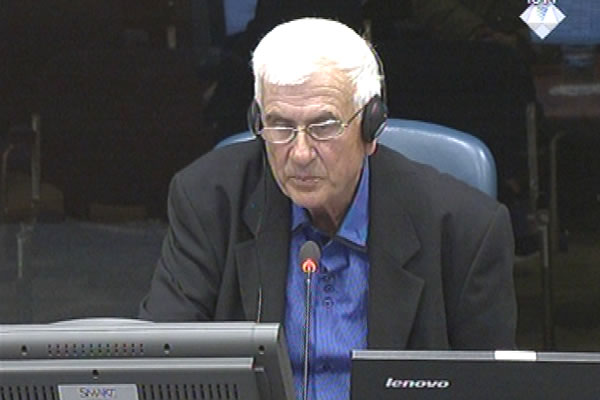Home
CRIMES WERE NOT ORDERED
In his evidence in Ratko Mladic’s defense former signals officer in the VRS Main Staff Tihomir Stevanovic claimed that he had never seen any orders to perpetrate crimes against the Muslims during the Srebrenica operation in July 1995. According to the witness, no document signed by the accused arrived in the Main Staff either on 15 or 16 July 1995 while mass executions were carried out
 Tihomir Stevanovic, defence witness at Rako Mladic trial
Tihomir Stevanovic, defence witness at Rako Mladic trial Retired Bosnian Serb lieutenant colonel Tihomir Stevanovic began his war career in the spring of 1992 as a signals officer in the Lukavica military barracks in Sarajevo. In March 1993, Stevanovic was transferred to the signals regiment in the VRS Main Staff in Crna Rijeka. After two years, Stevanovic was appointed encryption officer in the Main Staff. He held that post when the VRS launched the attack on Srebrenica in July 1995. According to the prosecutor the attack was followed by the genocide against local Muslims. Stevanovic testified in the defense of Ratko Mladic, former commander of the Main Staff. Mladic is on trial for the Srebrenica genocide and other crimes in BH.
In the first half of the examination-in-chief, the witness corroborated the defense’s case that the BH Army used civilian facilities in Sarajevo for military purposes. The Bosnian Serbs were thus justified when they shelled residential parts of the city; these artillery attacks were entirely legitimate. The witness noted that one of his relatives, who still resides in Sarajevo, told him that the Muslim units had used both the military hospital and the Kosevo hospital to position their artillery pieces and opened fire on Serb positions. The tunnel in the Sarajevo neighborhood of Ciglane was used for the same purpose. Also, the witness claimed that the attacks were launched from the Jajce military barracks located near Bascarsija.
Stevanovic described in detail how the Main Staff had communicated with the various subordinated corps. Orders and reports were conveyed primarily over radio relay communications and landlines, the witness said. Both conversations and written documents were protected by using encryption devices. Stevanovic tried to convince the Trial Chamber that it was impossible to wiretap the communications between Bosnian Serb military officers and military units. In other words, the witness implied that the intercepted conversations, including those pertaining to the Srebrenica operation, admitted into evidence as prosecution exhibits, were not authentic.
In the course of the trial, the defense has been trying to prove that during the mass executions of Srebrenica boys and men, on 15 and 16 July 1995, the accused was in Belgrade. In that period, the accused didn’t issue any orders to his subordinated units, the defense alleges. Asked if any orders signed by Mladic had reached the Main Staff during those two days, the witness that there had not been any. As Stevanovic explained, during the Srebrenica operation and in its aftermath he didn’t see any orders from the Main Staff instructing subordinated units to commit crimes.
While he served in the Main Staff, the witness often saw Mladic. This prompted defense counsel Ivetic to ask Stevanovic in the end of the examination-in-chief to share with the court his impression of Mladic. Stevanovic said that Mladic was a ‘fair but strict and highly professional officer’ who refused to accept defeat. Mladic respected others, and at the same time he loved and defended his people, the witness explained. He eventually 'paid the price' for that, Stevanovic said. Asked to specify what he meant, the witness said that during the war the accused lost his daughter and then he fell ill.
As the hearing drew to a close, prosecutor McCloskey began cross-examining Lieutenant Colonel Stevanovic.
